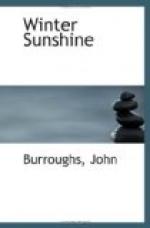In the inland farming districts what are the signs? Few and faint, but very suggestive. The sun has power to melt the snow; and in the meadows all the knolls are bare, and the sheep are gnawing them industriously. The drifts on the side-hills also begin to have a worn and dirty look, and, where they cross the highway, to become soft, letting the teams in up to their bellies. The oxen labor and grunt, or patiently wait for the shovel to release them; but the spirited horse leaps and flounders, and is determined not to give up. In the woods the snow is melted around the trees, and the burrs and pieces of bark have absorbed the heat till they have sunk halfway through to the ground. The snow is melting on the under side; the frost is going out of the ground: now comes the trial of your foundations.
About the farm buildings there awakens the old familiar chorus, the bleating of calves and lambs, and the answering bass of their distressed mothers; while the hens are cackling in the hay-loft, and the geese are noisy in the spring run. But the most delightful of all farm work, or of all rural occupations, is at hand, namely, sugar-making. In New York and northern New England the beginning of this season varies from the first to the middle of March, sometimes even holding off till April. The moment the contest between the sun and frost fairly begins, sugar weather begins; and the more even the contest, the more the sweet. I do not know what the philosophy of it is, but it seems a kind of see-saw, as if the sun drew the sap up and the frost drew it down; and an excess of either stops the flow. Before the sun has got power to unlock the frost, there is no sap; and after the frost has lost its power to lock up again the work of the sun, there is no sap. But when it freezes soundly at night, with a bright, warm sun next day, wind in the west, and no signs of a storm, the veins of the maples fairly thrill. Pierce the bark anywhere, and out gushes the clear, sweet liquid. But let the wind change to the south and blow moist and warm, destroying that crispness of the air, and the flow slackens at once, unless there be a deep snow in the woods to counteract or neutralize the warmth, in which case the run may continue till the rain sets in. The rough-coated old trees,—one would not think they could scent a change so quickly through that wrapper of dead, dry bark an inch or more thick. I have to wait till I put my head out of doors, and feel the air on my bare cheek, and sniff it with my nose; but their nerves of taste and smell are no doubt under ground, imbedded in the moisture, and if there is anything that responds quickly to atmospheric changes, it is water. Do not the fish, think you, down deep in the streams, feel every wind that blows, whether it be hot or cold? Do not the frogs and newts and turtles under the mud feel the warmth, though the water still seems like ice? As the springs begin to rise in advance of the rain, so the intelligence of every change seems to travel ahead under ground and forewarn things.




